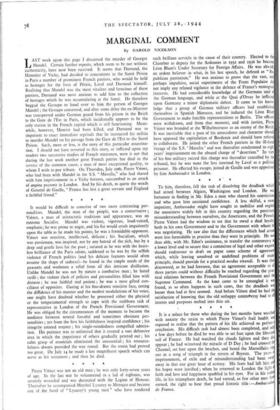It would be difficult to conceive of two more contrasting
per- sonalities. Mandel, the man of the people, was a conservative ; Vienot, a man of aristocratic traditions and appearance, was an extreme Socialist. Mandel was violent, vigorous, loud-voiced, emphatic; he was prone to anger, and his fist would crash impatiently upon the table as he made his points; he was a formidable opponent. Vienot was sensitive, intellectual, delicate ; his Socialism, which was passionate, was inspired, not by any hatred of the rich, but by a deep and gentle love for the poor ; satiated as he was with the heart- less brilliance of the Paris salons, saddened as he was by the selfish violence of French politics (and his delicate features would often assume the shape of sadness)—he found in the simple needs of the peasants and workmen a relief from all this intricate disillusion. Unlike Mandel he was not by nature a combative man ; he hated strife ; the violent clash of policies and personalities filled him with distaste ; he was faithful and patient ; he was a most gifted con- ciliator of opposites. Gazing at his fine-drawn sensitive face, noting the diffidence of his manner and the modest modulations of his voice, one might have doubted whether he possessed either the physical or the temperamental strength to cope with the stubborn task of representative in London of the French Provisional Government. He was obliged by the circumstances of the moment to become the mediator between several forceful and 'sometimes obstinate per- sonalities ; yet from the first his faithfulness inspired confidence ; his integrity created respect ; his single-mindedness compelled admira- tion. His patience was so unlimited that it-created a vast defensive area in which the impatience of others gradually petered out ; his calm grasp of essentials eliminated the unessential ; his resource- fulness always provided the way round. But the strain had proved too great. On July 14 he made a last magnificent speech which can serve as his testament ; and then he died.
• * * *


























 Previous page
Previous page